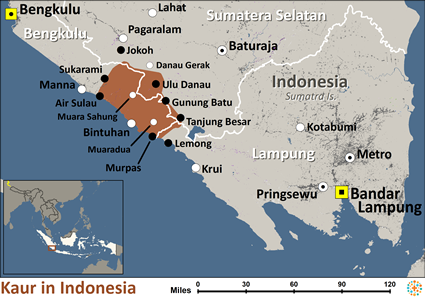The Kaur are one of the original peoples of Bengkulu Province in Indonesia and are not known in any other country. The Kaur speak their own language, which is part of the Malay language cluster.
Most Kaur villages are located in groups along the banks of small rivers in this area. Geographically, the Kaur may be divided into two subgroups: residents of the South Kaur district, often called the Bintuhan; and residents of the North Kaur district, who have been influenced by the Besemah people.
The Kaur depend primarily on rice cultivation for their livelihood. Other major crops include peanuts, coffee, coconut, resin, rubber, rattan, sweet potatoes and fruit - especially banana, mango, pineapple and many people's favorite, durian (a large fruit with a spiky shell and a strong smell).
Other jobs include tending livestock, fishing and trading. Kaur men work in the fields while the women manage their households. Although the Kaur live along the beach, very few are fishermen. The few who become fishermen use boats without engines, so they cannot go very far out into the ocean.
The Kaur live in blue and white painted tin-roofed houses with access to electricity. The houses typically include traditional woodburning stoves for cooking and a well located in the backyard.
The Kaur practice a system of working together called 'Gotong royong' (literally mutual co-operation). They especially emphasize assisting each other during harvest time.
The Kaur are not allowed to marry someone from the same clan but may marry a Kaur person from another village. Weddings can only take place in part of the year after the Rice Harvest Celebration. Generally, marriageable age is twenty for men and fifteen or sixteen for women.
The older generation had families with an average of thirteen children, but because of the government sponsored family planning program, families currently have only three children on average.
The Kaur people have been Sunni Syafi'I Muslims since the 17th century. Like other Malays they observe religious ceremonies with a communal meal (sedekah) to celebrate a birth, give thanks for a harvest, ask for rain, commemorate a death and ward off evil spirits.
The Kaur need better technology in order to increase agricultural production so they can produce enough food for their own consumption as well as for trade. Kaur villages near beaches have not yet tapped into the ocean as a source of income.
Ask God to show the Kaur that they cannot earn their salvation through works or religious ceremonies.
Pray for completion of the New Testament in the Kaur language and for distribution and usage of the JESUS film available in their language.
Ask God to raise up workers to take the gospel to the Kaur and to direct those workers to persons of peace whose hearts are open to the truth.
Pray for a movement to Christ among the Kaur to develop soon.
Scripture Prayers for the Kaur in Indonesia.
| Profile Source: Joshua Project |

























